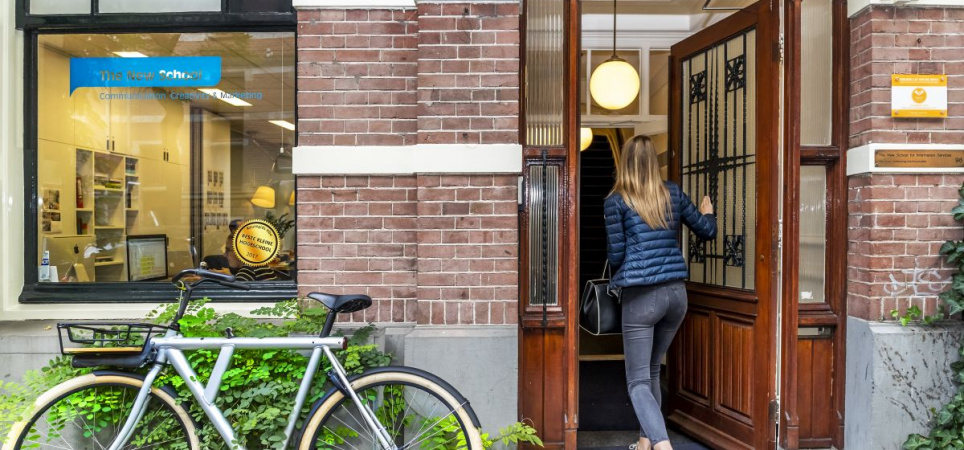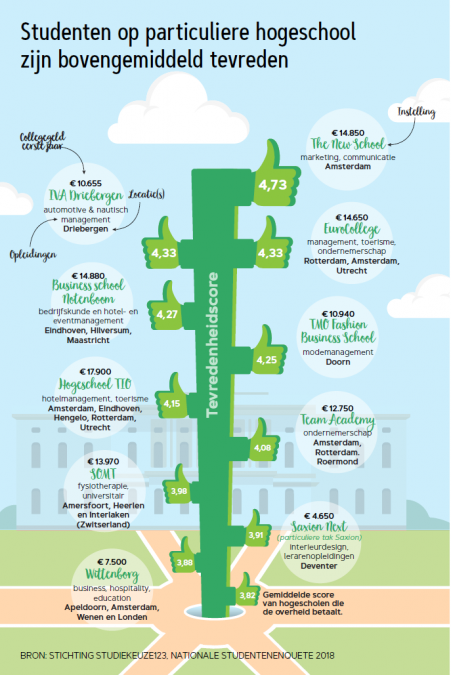Private colleges: small, good and expensive
Government-funded colleges can only dream of the satisfaction scores of private schools. Yet one in three is struggling with declining student numbers. Six institutions have closed the gates. Do private colleges price themselves out of the market?

Image: Angeliek de Jonge
Sanne Frowijn (24) wanted to do “something creative” after HAVO. She attended a lot of open days, but did not find what she was looking for at schools that the government funded. Art academies thought “she was too vague, too little concrete”, the Amsterdam Fashion Institute of the Hogeschool van Amsterdam was too specialized for her. "That training is completely focused on the fashion industry." On the internet she came across Artemis Academy, a private college offering the four-year bachelor's degree all-round styling offers. This broad training focuses not only on fashion, but also on interior design, food styling and media design.
Frowijn attended an open day of the academy on the Amsterdam Prinsengracht and was sold. “I immediately felt at home. The canal house where the lessons are given is also very cozy. ” The practical, commercial approach of the study appealed to her. “You do get subjects such as photography and graphic design, but it's all about developing marketing concepts. The training is really aimed at the business world, which ensures that you have a better chance of a job. ”
When Frowijn started studying seven ago, the course cost 6000 euros a year, but tuition fees have now risen to 7450 euros. “A lot of money, but not an exceptional amount,” she says. “There are many more expensive courses. My parents saw that I was very enthusiastic about this training and thought it was important that I would do something that I wanted to do. They gave it to me. ”
Artemis is indeed not the only institution where a year of study costs thousands of euros. Since 2012, government-funded study programs can apply for the 'small-scale and intensive education' quality mark. If they have that, they can select at the gate and charge a maximum of five times the statutory tuition fees, which amounts to 10.000 euros. This scheme was created for the Liberal Arts Colleges of the universities, but now hotel schools and art academies also make use of it.
Business training
Artemis is certainly not the most expensive private training. The database of the NVAO accreditation organization contains 44 non-government-funded universities of applied sciences. Together, they offer 292 accredited HBO bachelor's degrees, according to figures that the Education Magazine requested from the Education Inspectorate. In 85 percent of the cases, it concerns part-time courses for workers, some 18 private colleges focus on young people aged 25 to XNUMX who are following a full-time course.
Students are very enthusiastic about the very expensive private courses
Most of them offer business courses aimed at a specific sector, such as the automotive industry or tourism. You can also go to a private institution for physiotherapy, photography, psychology or higher professional education. Provided you have parents who want to pay a lot of money or are not afraid of building up a substantial student debt. Because at private universities of applied sciences a year of study can easily cost EUR 15.000. At TIO Hogeschool you pay the main prize. A course in hotel management, international tourism, e-commerce or international business costs 17.900 euros per year, excluding 250 euros registration fee that is collected once.
Students are extremely enthusiastic about the very expensive programs, according to the National Student Survey 2018, in which sixteen private universities of applied sciences participated. Mainstream universities of applied sciences can only dream of the satisfaction ratings distributed by their students. HBO students give their education an average of 3,82 on a scale of 5, the Studiekeuze123 Foundation (which uses the NSE) announced at the end of June. Programs at small, single-sector university colleges fare slightly better with a 4,0, but the comparable private institutions participating in the NSE come out with an average of 4,11.
This is mainly due to the high score of The New School. This Amsterdam marketing communication course costs 14.850 euros for the first year, but apparently students think they get their money's worth. The school has been at the top of the for years Keuzegids HBO, thanks to the designation “good” that the program received during the accreditation in 2014 and thanks to the high NSE scores. With a satisfaction score of 4,73 (9,5 on a ten-point scale), the school is again at the top of the rankings this year.
Living room atmosphere
The New School, which calls itself TNS for short, owes the exceptionally high appreciation to the small class sizes, the intensive program and the personal attention. TNS is probably the smallest university of applied sciences in the Netherlands. Each year, only XNUMX to XNUMX students can start the program, a maximum of four classes of XNUMX students. More does not fit in the two stately houses in the Amsterdam concertgebouw area where the lessons are given.
When applying for a job, it's not about your degree, it's about who you are
But there are more private colleges that profile themselves with small classes. TNS distinguishes itself mainly with an informal, living room-like atmosphere, according to fourth-year student Falco Jensma. "It is not a business education where you will be sent home if you do not come to school in a suit." TNS is a course for creative, enterprising students who end up in marketing and communication positions at media companies. “Or in a profession that does not yet exist,” says director Kees Spijker. “Nobody knows what the labor market will look like in five years. That is why personal development is central to us. We offer a broad program in which students develop step by step in a direction that suits them. Because when applying for a job it's not about your diploma, but about who you are. ”
 “In the first two years, you take subjects such as consumer psychology and creative writing, as well as business administration and photography,” says Jensma. “It is really very broad. I am now developing into a marketing strategist, but a friend of mine has become a graphic designer. ”
“In the first two years, you take subjects such as consumer psychology and creative writing, as well as business administration and photography,” says Jensma. “It is really very broad. I am now developing into a marketing strategist, but a friend of mine has become a graphic designer. ”
The fact that these subjects are taught by freelance teachers who teach one day a week and who spend the rest of the time with both feet in professional practice is perhaps the most important asset. “TNS is not a learning factory where teachers read from a book,” says director Spijker. Apparently his students think so too. HBO scores an average of 3,87 on the NSE item “the knowledge of teachers about professional practice”, while TNS comes out at 4,75.
“Students really learn by doing this”, says freelance journalist Claudia Ruigendijk who has been teaching journalism, argumentation and language skills since 2015. “It really took some getting used to for me in the beginning because I taught at universities for this. I was used to giving lectures there, I do that much less here. Students here work a lot on practical assignments. That means that as a teacher you have to come up with a lot of practical working methods. ”
Inspiring teachers
Artemis Academy also works with freelance teachers from professional practice who teach one day a week, says Sanne Frowijn. "They really know what is going on in practice and I found that very inspiring." After graduating, she moved on to the University of Amsterdam. “I wanted to go into depth and better substantiate the marketing concepts that I developed at Artemis. That's why I started studying communication science. ” This summer she completed her master's degree. She is now a trainee at the international marketing agency Mindshare, a position she won with her bachelor's thesis on the effectiveness of personalized advertising.
Freelance teachers from the professional field really know what is going on in practice and I found that very inspiring
Frowij took seven years to complete her studies, but if she had to do it again, she would start again at Artemis. “There I did a lot of photography and learned to work with layout programs. As a result, I now have the skills I need to show photographers and graphic designers what I have in mind. So I think I have chosen a very nice learning path. ”
While private colleges may have some of the best college degrees in-house, things aren't really taking off. At the end of August, students who wanted to start a course in September could still go to Luzac University of Applied Sciences or the physiotherapy course Thim van der Laan. The Amsterdam branch of Nyenrode is closing down, the class that started at the new business school last year was the last. The New School also had a few open places at the end of August, but they were filled just before the start of the academic year.
How many students are following a non-subsidized higher professional education program will become clear for the first time at the end of this year because private trainers have only been obliged to notify DUO of the number of registrations since 1 January. One in three non-funded institutions is concerned about declining student numbers, the Education Inspectorate reported in April in the State of Education. Three private institutions have already stopped offering higher professional education programs and three others are phasing out. These are small niche players who only provide one or two courses, according to a spokesman for the inspection.
Loan anxiety
“That fits in with the trend that we are seeing,” says Bert Tieben of SEO, the economic research institute of the University of Amsterdam. On behalf of the trade association of private educators, SEO maps out developments in the private education market once every four years. The monitor that appeared at the end of June shows that the market share of courses aimed at an MBO or HBO diploma has fallen from 18 percent in 2010 to 9 percent in 2018. The causes have not been investigated. “Private providers complain about the high costs associated with accreditations and that may be why they are withdrawing,” Tieben suggests.
Most Dutch students do not want to go into debt
Although the decline started earlier, the abolition of the basic grant could also play a role, the researcher thinks. Students who follow a private education can borrow an extra 10.000 euros to pay the high tuition fees. “But most Dutch students don't want to get into debt,” says TNS student Falco Jensma. He has not done that himself. He paid for the first year of study himself with money he had earned after dropping out of a government-funded college education for the second time. Now that his parents have seen that this time it means business, they pay the rest of the study costs.
Not all parents are able to do that, of course, which is unfortunate, because the demand for small-scale education that pays a lot of attention to personal development is only increasing, Kees Spijker thinks. “Students drown in the massiveness of government-funded education or find it difficult to find a place in the educational jungle. As a result, the dropout is high. Those students are looking for an alternative and then quickly end up with a small private study program. ”
“You would give all those dropouts small-scale education,” sighs Claudia Ruigendijk. "Our students really benefit from the personal attention we give them."


